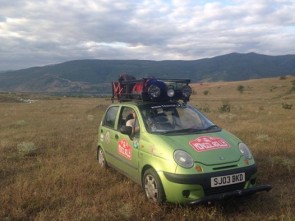Parker Vascik, O∆K’s national student vice president, and Emma Bones, another O∆K member, are participating in the 2014 Mongol Rally. Parker and Emma are blogging about their experiences for O∆K.
In fact, it takes a team. Since the first moment I considered the Mongol Rally back in September 2013, I sought to assemble a well-rounded team.
I began by creating a list of what skills I had that would be helpful for the rally. These included abilities such as navigation, camping, communication, planning and conflict management. After this self-assessment, I then identified other essential abilities needed for the rally that I would need to look for in potential teammates. Riley brought automotive repair, technology and security to the team while Emma added medical capability, situational awareness and extensive knowledge of and experience in developing countries.
By intentionally looking for team members with diverse skill sets and discussing these abilities before the trip, we found ourselves well prepared for many of the challenges we faced, thus far, on the road. However, despite our best efforts, we have identified a few areas where we still lack sufficient expertise: most notably in language and car repair.
While I personally believe in trial by fire (i.e., why I taught Riley to drive a manual car on the left side of the road in British traffic), the learning curve for these two fields is simply too steep to master effectively on the road. Therefore, our team has utilized partnerships to fill these skill gaps.
In Azerbaijan and through Turkmenistan where the authorities had very little tolerance for non-Russian speakers, we teamed up with a Lithuanian team who fluently spoke the language. This partnership saved us major headaches and potential detainment. How did we make such a partnership? All we did was to ask the Lithuanian team simply for help.
Similarly, after crossing the Caspian Sea we found that the roads were… well… not exactly what we would consider roads in the United States. Beyond splitting our car frame and blowing up our muffler in Uzbekistan, we sheared both our rear suspension coils in Tajikistan, wore through our breaks in Turkmenistan, punctured our fuel tank in Kyrgyzstan and severed our front right wheel assembly in Kazakhstan. These breakdowns would have been beyond our team’s ability to repair, but we had chosen to partner with a British team who was mechanically savvy. With their help, we have been able to overcome all these challenges quickly.
Recognizing opportunities for partnership is an essential leadership skill. We bolstered our chances to finish the rally by supplementing our skill set and filling gaps. While we did not offer much in return to the Lithuanians and that partnership ended when they needed to push ahead, we were able to provide value to the British team through our healthcare, camping and communication skills. By providing value both ways, the partnership is still strong after nearly two weeks of challenges.
The value of partnerships and team member skill mix are not just applicable to crazy Eurasian road rallies. These are leadership lessons that each of us should look to apply to every group and situation in which we lead.
Next stop – Russia. Look for another post soon!
More information about 3.F.L.P. team including Parker and Emma may be found here.


